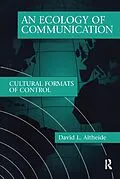Altheide's new book advances the argument set in motion some years ago with Media Logic and continued in Media Worlds in the Postjournalism Era: that in our age, information technology and the communication enviroments it posits have affected the private and the social spheres of all our power relationships, redefining the ground rules for social life and concepts such as freedom and justice., Articulated through an interactionist and non-deterministic focus, An Ecology of Communication offers a distinctive perspective for understanding the impact of information technology, communication formats, and social activities in the new electronic environment.
Autorentext
David L. Altheide is Regents Professor, School of Justice Studies, Arizona State University. A recipient of both the Premio Diego Fabbri and Charles Horton Cooley awards, Dr. Altheide was President of the Society for the Study of Symbolic Interaction in 1995-96., Dr. Altheide is a frequent contributor to major journals, and is author of Media Power; Creating Reality: How TV News Distorts Events; and coauthor of Media Logic; Bureaucracy and Freedom; Bureaucratic Propaganda; and (with Robert P. Snow) Media Worlds in the Postjournalism Era (Aldine).
Inhalt
Preface, 1 THE ECOLOGY OF COMMUNICATION AND THE EFFECTIVE ENVIRONMENT, Communication and the Effective Environment, Communication in Context, Whacko in Waco, From News as Knowledge to News as Advertising, Communication as Surveillance and Monitoring, Formats of Control: Testing, The Sign of the Times: The Testing Format, Morality Performance, Marketing-as-Surveillance, Decoding Control: Behind Bar Codes, Marketing and Promoting Products, Summary, 2 COMPUTER FORMATS AND BUREAUCRATIC STRUCTURES, Communication Formats, Computer Formats, Division of Labor, The Computer and Official Information, Keyboarding as a Social Form, Toys, Tools, and Terminals, Mediated Social Order, The Persuasive Terminal: Producing the "Game Boy", Conclusion, 3 THE CULTURE OF ELECTRONIC COMMUNICATION AND THE SELF, From Content to the Message, Mediation in Social Life, Formats of Control and the Self, Information and an Ecology of Communication, Culture and Information, TV and the Library on the Move, Summary, 4 DISPUTE TRANSFORMATION AND THE ECOLOGY OF COMMUNICATION, The Ecology of Communication and Adjudication, Dispute Resolution and Informal Justice, Action Lines in Context, The Audience as Disputants, Data and Method, Complainant Letters, Aired Stories, Findings about Complainant Letters, Findings on Aired Stories, Summary, 5 GONZO JUSTICE, Power and Communication, The News Media in Relief, Time for Gonzo, Conclusion, 6 GONZO DEMOCRACY: THE CASE OF AZSCAM, Communication Technology and Logic, From Journalism to Postjournalism, Information Technology and the Market Context, Entertainment and Social Control, From ABSCAM to AZSCAM, Public Disclosure and Media Logic, Conclusion, 7 POLICY AND THE ECOLOGY OF COMMUNICATION: "THE MISSING CHILDREN PROBLEM", The Mass Media, Social Problems and Social Issues, General Effects on Social Policy, Finding the Missing Children Issue, The Role of Mass Media, The Career of a Social Problem, Counterclaims, The Information Context of Social Problems, Design of Inquiry, Data, Variables, Results, Conclusion, 8 THE ECOLOGY OF COMMUNICATION AND TV COVERAGE OF TERRORISM IN THE UNITED STATES AND GREAT BRITAIN, Mediated Violence, Symbols and Media Formats, A Comparative Look at Terrorism on Television, Research Design and Data, The Incident, The British Coverage of the Incident, The American Networks' Coverage of the Incident, Conclusion, 9 POSTJOURNALISM: THE GULF WAR IN PERSPECTIVE, An Approach, Media Logic and Postjournalism, The Disappearing Event, The Look of War, Grenada, Panama, The Gulf War, The Invasion of Kuwait, Negotiations, and Planning, The Air War, The Ground War, Settlement, Postwar, Conclusion, 10 CONCLUSION: OUR COMMUNICATIVE FUTURE, REFERENCES, AUTHOR INDEX, SUBJECT INDEX
